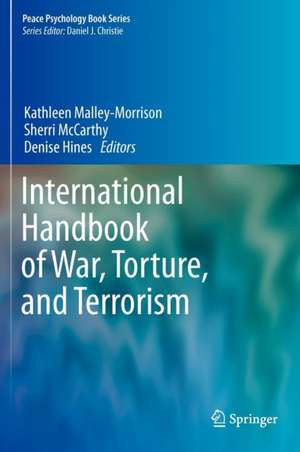International Handbook of War, Torture, and Terrorism: Peace Psychology Book Series
Editat de Kathleen Malley-Morrison, Sherri McCarthy, Denise Hinesen Limba Engleză Hardback – 14 dec 2012
The International Handbook of War, Torture, and Terrorism synthesizes historical backgrounds, current trends, and findings from the Personal and Institutional Rights to Aggression and Peace Survey (PAIRTAPS), administered in forty countries over nine global regions. Contributors examine the social, cognitive, and emotional roots of people’s thinking on war and national security issues, particularly concerning the role of governments in declaring war, invading other countries, or torturing prisoners. By focusing on the cultural traditions and colonial histories of broad regions rather than of individual nations, the book demonstrates how context shapes ordinary citizens’ views on what is justifiable during times of war, as well as more nebulous concepts of patriotism and security. The Handbook:
- Introduces the PAIRTAPS and explains the methodology for analyzing responses.
- Defines war-related concepts from the unique perspectives of Western Europe, U.K./U.S., Middle East, Gulf States, Russia/Balkans, Africa, Latin America, South/Southeast Asia, and East Asia.
- Provides an integrative summary of definitions and points of view.
- Situates results in terms of social engagement/disengagement theory.
- Considers implications for peace and reconciliation.
| Toate formatele și edițiile | Preț | Express |
|---|---|---|
| Paperback (1) | 1682.28 lei 6-8 săpt. | |
| Springer – 23 aug 2016 | 1682.28 lei 6-8 săpt. | |
| Hardback (1) | 1690.13 lei 6-8 săpt. | |
| Springer – 14 dec 2012 | 1690.13 lei 6-8 săpt. |
Din seria Peace Psychology Book Series
- 18%
 Preț: 779.26 lei
Preț: 779.26 lei -
 Preț: 361.07 lei
Preț: 361.07 lei - 15%
 Preț: 639.25 lei
Preț: 639.25 lei - 18%
 Preț: 788.54 lei
Preț: 788.54 lei - 15%
 Preț: 699.28 lei
Preț: 699.28 lei - 15%
 Preț: 646.62 lei
Preț: 646.62 lei - 15%
 Preț: 645.28 lei
Preț: 645.28 lei - 24%
 Preț: 1044.87 lei
Preț: 1044.87 lei - 18%
 Preț: 945.14 lei
Preț: 945.14 lei - 15%
 Preț: 649.54 lei
Preț: 649.54 lei -
 Preț: 386.39 lei
Preț: 386.39 lei - 15%
 Preț: 697.82 lei
Preț: 697.82 lei - 15%
 Preț: 591.14 lei
Preț: 591.14 lei - 18%
 Preț: 1222.94 lei
Preț: 1222.94 lei - 15%
 Preț: 644.82 lei
Preț: 644.82 lei - 15%
 Preț: 649.22 lei
Preț: 649.22 lei - 15%
 Preț: 697.65 lei
Preț: 697.65 lei -
 Preț: 388.72 lei
Preț: 388.72 lei - 15%
 Preț: 647.08 lei
Preț: 647.08 lei - 24%
 Preț: 967.03 lei
Preț: 967.03 lei - 15%
 Preț: 638.89 lei
Preț: 638.89 lei - 15%
 Preț: 650.37 lei
Preț: 650.37 lei - 18%
 Preț: 733.15 lei
Preț: 733.15 lei -
 Preț: 398.74 lei
Preț: 398.74 lei - 15%
 Preț: 644.30 lei
Preț: 644.30 lei - 18%
 Preț: 1116.57 lei
Preț: 1116.57 lei -
 Preț: 365.05 lei
Preț: 365.05 lei - 15%
 Preț: 643.99 lei
Preț: 643.99 lei - 18%
 Preț: 1116.26 lei
Preț: 1116.26 lei - 18%
 Preț: 1381.26 lei
Preț: 1381.26 lei - 18%
 Preț: 1595.75 lei
Preț: 1595.75 lei - 18%
 Preț: 779.89 lei
Preț: 779.89 lei
Preț: 1690.13 lei
Preț vechi: 2061.14 lei
-18% Nou
Puncte Express: 2535
Preț estimativ în valută:
323.44€ • 351.21$ • 271.69£
323.44€ • 351.21$ • 271.69£
Carte tipărită la comandă
Livrare economică 22 aprilie-06 mai
Preluare comenzi: 021 569.72.76
Specificații
ISBN-13: 9781461416371
ISBN-10: 146141637X
Pagini: 748
Ilustrații: XL, 706 p.
Dimensiuni: 178 x 254 x 48 mm
Greutate: 1.5 kg
Ediția:2013
Editura: Springer
Colecția Springer
Seria Peace Psychology Book Series
Locul publicării:New York, NY, United States
ISBN-10: 146141637X
Pagini: 748
Ilustrații: XL, 706 p.
Dimensiuni: 178 x 254 x 48 mm
Greutate: 1.5 kg
Ediția:2013
Editura: Springer
Colecția Springer
Seria Peace Psychology Book Series
Locul publicării:New York, NY, United States
Public țintă
ResearchCuprins
Part I. Perspectives on National Security.- Western Europe.- United Kingdom, Canada, United States & Australia.- Central and Southern Europe, and Eurasia.- The Middle East.- The Gulf States.- Africa. Latin America.- South and Southeast Asia.- East Asia.- Part II. Perspectives on Protest.- Western Europe.- United Kingdom, Canada, United States & Australia.- Central and Southern Europe, and Eurasia.- The Middle East.- The Gulf States.- Africa. Latin America.- South and Southeast Asia.- East Asia.- Part III. Apology and Forgiveness.- Western Europe.- United Kingdom, Canada, United States & Australia.- Central and Southern Europe, and Eurasia.- The Middle East.- The Gulf States.- Africa. Latin America.- South and Southeast Asia.- East Asia.- Part IV. Perspectives on Peace and Reconciliation.- Western Europe.- United Kingdom, Canada, United States & Australia.- Central and Southern Europe, and Eurasia.- The Middle East.- The Gulf States.- Africa. Latin America.- South and Southeast Asia.- East Asia.
Recenzii
From the reviews:
“This text examines the antecedent emotions and beliefs of individuals around the globe concerning concepts such as war, terrorism, national security, invasion, and torture. … the text is a gold mine for anyone wanting to engage in research related to peace psychology, international relations, political science, anthropology, and other disciplines. … This text is a fundamental ‘must have’ for politicians, policy makers, peace psychologists and anyone working to address issues of armed conflict and mass violence around the globe.” (Linda M. Woolf, PsycCRITIQUES, Vol. 59 (1), January, 2014)
“This text examines the antecedent emotions and beliefs of individuals around the globe concerning concepts such as war, terrorism, national security, invasion, and torture. … the text is a gold mine for anyone wanting to engage in research related to peace psychology, international relations, political science, anthropology, and other disciplines. … This text is a fundamental ‘must have’ for politicians, policy makers, peace psychologists and anyone working to address issues of armed conflict and mass violence around the globe.” (Linda M. Woolf, PsycCRITIQUES, Vol. 59 (1), January, 2014)
Notă biografică
Kathleen Malley-Morrison's research interest is in cross-cultural and international perspectives on violence. She has done extensive research on violence and abuse in families and other intimate relationships. Her current research projects focus on the views of ordinary people around the world on the potential right of governments to conduct acts of aggression (e.g., invasion, torture) and the rights of individuals to live in a world of peace and protest against war.
Textul de pe ultima copertă
Armed conflict, on domestic or foreign soil, impacts people’s daily lives and shapes policy around the world. Millions live with the threat of terrorism, whether from random sources or known enemies. And the acceptability of torture is debated by politicians and public alike.
The International Handbook of War, Torture, and Terrorism synthesizes historical backgrounds, current trends, and findings from the Personal and Institutional Rights to Aggression and Peace Survey (PAIRTAPS), administered in forty countries over nine global regions. Contributors examine the social, cognitive, and emotional roots of people’s thinking on war and national security issues, particularly concerning the role of governments in declaring war, invading other countries, or torturing prisoners. By focusing on the cultural traditions and colonial histories of broad regions rather than of individual nations, the book demonstrates how context shapes ordinary citizens’ views on what is justifiableduring times of war, as well as more nebulous concepts of patriotism and security. The Handbook:
The International Handbook of War, Torture, and Terrorism synthesizes historical backgrounds, current trends, and findings from the Personal and Institutional Rights to Aggression and Peace Survey (PAIRTAPS), administered in forty countries over nine global regions. Contributors examine the social, cognitive, and emotional roots of people’s thinking on war and national security issues, particularly concerning the role of governments in declaring war, invading other countries, or torturing prisoners. By focusing on the cultural traditions and colonial histories of broad regions rather than of individual nations, the book demonstrates how context shapes ordinary citizens’ views on what is justifiableduring times of war, as well as more nebulous concepts of patriotism and security. The Handbook:
- Introduces the PAIRTAPS and explains the methodology for analyzing responses.
- Defines war-related concepts from the unique perspectives of Western Europe, U.K./U.S., Middle East, Gulf States, Russia/Balkans, Africa, Latin America, South/Southeast Asia, and East Asia.
- Provides an integrative summary of definitions and points of view.
- Situates results in terms of social engagement/disengagement theory.
- Considers implications for peace and reconciliation.
Caracteristici
Companion volume to International Handbook of Peace and Reconciliation Comparison and contrast of the various methods of peace and protest as seen around the world Application of both Bandura's moral disengagement theory as well as consensus theory as related to reconciliation and negotiation










